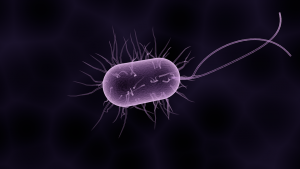Probiotics Aid Weight Loss and Body Fat Reduction

Our gut bacteria influences our ability to lose weight.
Our gut’s probiotics have everything to do with our ability to lose weight. And the amount of body fat we are carrying around.
Ever wonder why some people seem to have more inflammation, fatigue and obesity than others despite their best efforts? Recent research confirms these relate to the diversity of our gut’s probiotic bacteria.
In other words, the science has continued to discover that obesity is related to our gut’s microbiome. And studies have now found that probiotic supplementation can help us lose weight.
In this article
Probiotics reduce weight and body fat
The most recent study comes from Finland’s University of Helsinki. Here researchers tested 225 adult volunteers who had BMIs (body mass index) ranging from 28 to 35. They divided the subjects into groups. Those given a probiotic supplement consisting of 13-14 billion CFUs of Bifidobacterium lactis (B420) per day. Others were given a placebo. The researchers found the probiotic supplementation resulted in a 4.5 percent reduction in body fat mass compared to the placebo group.
The probiotic group also had significant reductions in waist circumference, with an average of 2.4 percent.
A 2013 study from Japan tested 210 overweight adults. They divided the people into two groups. One group was given a placebo and the other was given a fermented milk with 100 million CFUs of Lactobacillus gasseri (SBT2055). The treatment lasted for 12 weeks.
The subjects’ abdominal visceral fat regions were measured with computed tomography at the beginning and the end of the treatment period. They also measured body mass index, body fat mass and waist and hip circumferences.
The researchers found the probiotic treatment reduced visceral fat by 8.2 percent. They also had reduced BMI and waist and hip circumferences at the end of the study.
Obesity linked to bacteria infection
A 2012 study from New York University’s School of Medicine found that obesity and lack of blood sugar control are associated with overgrowths of Helicobacter pylori. This is a species of bacteria that colonizes in the stomach.
The research, led by Yu Chen, Ph.D., MPH, an Environmental Medicine professor at New York University, consisted of a cross-sectional analysis of examinations of 13,489 people tested for Helicobacter pylori bacteria and glycosylated hemoglobin – also called HbA1c.
After eliminating possible conflicting data, they found that those with former or present H. pylori infections had higher HbA1c levels, as well as higher body mass index levels (BMI).
Higher levels of HbA1c levels have been associated with glucose intolerance – also referred to as lack of blood sugar control. This is because glucose reacts with hemoglobin in the bloodstream to produce glycated hemoglobin. Higher HbA1c levels indicate abnormally high levels of blood sugar. Therefore, doctors will typically test HbA1c levels, and if they find that HbA1c levels are above normal ranges, they will suspect the patient has glucose intolerance and possibly even diabetes.
Increased HbA1c levels are also associated with obesity, as glucose intolerance increases fat storage. High HbA1c levels have also been associated with cardiovascular disease and diabetes.
The researchers noted that the greatest association with H. pylori occurred in those people with a combination of higher HbA1c levels and higher BMI levels. This correlates with other clinical data finding that many obese people also suffer from poor blood sugar control.
H. pylori is a bacteria that colonizes the stomach and upper intestines. H. pylori infections were found to be associated with ulcers more than a decade ago.
The overgrowth of H. pylori in the stomach and intestines has been the subject of controversy over the past few years. Probiotic research has found that H. pylori infections are reduced and controlled by probiotic supplementation. This may well be why research has also found that probiotics help weight loss and increase glucose control.
Greater probiotic diversity = lower risk of obesity
Human clinical research from France has found that the more genetic diversity our gut bacteria have, the lower our tendency for inflammation, obesity and metabolic dysfunction.
The research comes from France’s Institut National de la Recherche Agronomique (National Institute of Agronomic Research or INRA). In a study that culminated from a decade of progressive research linking probiotics to obesity, over 75 prominent European researchers assembled to gather and analyze the data from 292 patients.
The researchers tested 123 obese Danish people, along with 169 non-obese Dans. They conducted medical examinations on each individual, measuring not only their weight and body fat, but their level of insulin resistance, cholesterol levels, cardiovascular condition and general inflammation parameters.
Individual gut bacteria
The researchers also tested the makeup of each individual’s gut bacteria. This was done through DNA analysis, which tests the genetic diversity – read the number of different strains – of the probiotic bacteria living within the gut.
The research found that 23% of the entire group of 292 had low levels of diversity – which the researchers referred to as “bacterial richness.” This 23% had an average of 380,000 genes, while the average gene count of those with more diverse bacteria had a count of 640,000 genes on average.
More importantly, the researchers found that those with lower probiotic diversity had significantly greater levels of obesity, higher cholesterol levels, more insulin resistance and a greater level of inflammatory conditions.
Those with lower levels of probiotic diversity also would struggle more with their weight. The researchers noted:
“The obese individuals among the lower bacterial richness group also gain more weight over time.”
In their investigation of the strains of probiotics that directly lead to greater probiotic diversity, the researchers found that species of Faecalibacterium, Bifidobacterium, and Lactobacillus were associated with greater gene microbiota diversity. They also found that pathogenic microorganism genus’ such as Bacteroides and Ruminococcus are linked with lower levels of genetic diversity.
It should be added that the former group of probiotic bacteria have been linked in other research as being anti-inflammatory, while those in the second (pathogenic) group have been associated in other research as being pro-inflammatory microorganisms.
Another French study – a partner study within MetaHIT, a European Union-commissioned organization focused upon solving obesity and metabolic disease among western countries – also linked lower probiotic gene diversity with greater levels of inflammation.
In this study, 49 obese or overweight patients were tested for gene diversity among their intestinal bacteria. The researchers found that 40% of the group had lower levels of probiotic gene diversity, and these individuals also had greater levels of “low-grade inflammation” and general “dys-metabolism” as compared with the rest of the group.
New research from Kings College in the UK and Cornell University – funded by the National Institutes of Health – has found the key to this individualistic metabolism: Our gut bacteria – defined genetically as our microbiome.
Microbiome research confirms weight loss link to gut bacteria
The researchers conducted a multi-pronged study that first investigated the relationship between ones genes and their gut bacteria. This was done by testing fecal samples from 416 sets of twins – both identical (monozygotic) and non-identical (dizygotic) twins.
The research found that identical (monozygotic) twins were most likely to also share the same types of gut bacteria. The fecal samples allowed the researchers to run DNA scans – which analyze the range of genes.
The research also found that a particular family of bacteria dominated the microbiota of those twins that had a low body mass index (BMI). The predominant family found among low-BMI people is called Christensenellaceae.
And one of the prominent bacteria species found among the skinnier people was Christensenella minuta.
Ones microbiota is the range of different species of gut bacteria – in this case found by analyzing the feces.
And because parents will typically pass on their microbiota to their children, this also means that weight management abilities are also somewhat inherited. But because our microbiota is also determined by our diets, this also means that our diets and the diets of our parents are connected to our ability to lose weight.
Healthier diet linked
This study also found that a healthier diet with fewer processed carbohydrates (read junk food) led to higher scores of genetic diversity. However, the dietary intervention did not work as well for those with lower levels of genetic diversity at the beginning of the study:
“Dietary intervention improves low gene richness and clinical phenotypes, but seems to be less efficient for inflammation variables in individuals with lower gene richness.”
In other words, a diet that aids the growth of healthy probiotics with prebiotics help reduce weight and inflammation, but the problem of lower levels of probiotics in the gut must also be focused upon.
References
Stenman LK, Lehtinen MJ, Meland N, Christensen JE, Yeung N, Saarinen MT, Courtney M, Burcelin R, Lähdeaho ML, Linros J, Apter D, Scheinin M, Kloster Smerud H, Rissanen A, Lahtinen S. Probiotic With or Without Fiber Controls Body Fat Mass, Associated With Serum Zonulin, in Overweight and Obese Adults-Randomized Controlled Trial. EBioMedicine. 2016 Nov;13:190-200. doi: 10.1016/j.ebiom.2016.10.036.
Kadooka Y, Sato M, Ogawa A, Miyoshi M, Uenishi H, Ogawa H, Ikuyama K, Kagoshima M, Tsuchida T. Effect of Lactobacillus gasseri fermented milk on abdominal adiposity in adults in a randomised controlled trial. Br J Nutr. 2013 Nov 14;110(9):1696-703. doi: 10.1017/S0007114513001037.
Le Chatelier E, Nielsen T, Qin J, Prifti E, Hildebrand F, Falony G, Almeida M, Arumugam M, Batto JM, Kennedy S, Leonard P, Li J, Burgdorf K, Grarup N, Jørgensen T, Brandslund I, Nielsen HB, Juncker AS, Bertalan M, Levenez F, Pons N, Rasmussen S, Sunagawa S, Tap J, Tims S, Zoetendal EG, Brunak S, Clément K, Doré J, Kleerebezem M, Kristiansen K, Renault P, Sicheritz-Ponten T, de Vos WM, Zucker JD, Raes J, Hansen T; MetaHIT consortium, Bork P, Wang J, Ehrlich SD, Pedersen O, Guedon E, Delorme C, Layec S, Khaci G, van de Guchte M, Vandemeulebrouck G, Jamet A, Dervyn R, Sanchez N, Maguin E, Haimet F, Winogradski Y, Cultrone A, Leclerc M, Juste C, Blottière H, Pelletier E, LePaslier D, Artiguenave F, Bruls T, Weissenbach J, Turner K, Parkhill J, Antolin M, Manichanh C, Casellas F, Boruel N, Varela E, Torrejon A, Guarner F, Denariaz G, Derrien M, van Hylckama Vlieg JE, Veiga P, Oozeer R, Knol J, Rescigno M, Brechot C, M’Rini C, Mérieux A, Yamada T. Richness of human gut microbiome correlates with metabolic markers. Nature. 2013 Aug 29;500(7464):541-6.
Cotillard A, Kennedy SP, Kong LC, Prifti E, Pons N, Le Chatelier E, Almeida M, Quinquis B, Levenez F, Galleron N, Gougis S, Rizkalla S, Batto JM, Renault P; ANR MicroObes consortium, Doré J, Zucker JD, Clément K, Ehrlich SD, Blottière H, Leclerc M, Juste C, de Wouters T, Lepage P, Fouqueray C, Basdevant A, Henegar C, Godard C, Fondacci M, Rohia A, Hajduch F, Weissenbach J, Pelletier E, Le Paslier D, Gauchi JP, Gibrat JF, Loux V, Carré W, Maguin E, van de Guchte M, Jamet A, Boumezbeur F, Layec S. Dietary intervention impact on gut microbial gene richness. Nature. 2013 Aug 29;500(7464):585-8. doi: 10.1038/nature12480.
Chen Y, Blaser MJ. Association Between Gastric Helicobacter pylori Colonization and Glycated Hemoglobin Levels. J Infect Dis. 2012 Mar 13.
Goodrich JK, Waters JL, Poole AC, Sutter JL, Koren O, Blekhman R, Beaumont M, Van Treuren W, Knight R, Bell JT, Spector TD, Clark AG, Ley RE. Human Genetics Shape the Gut Microbiome. Cell, 2014; 159 (4): 789 DOI: 10.1016/j.cell.2014.09.053
Munyaka PM, Khafipour E, Ghia JE. External influence of early childhood establishment of gut microbiota and subsequent health implications. Front Pediatr. 2014 Oct 9;2:109. doi: 10.3389/fped.2014.00109.
Adams C. Probiotics – Protection Against Infection: Using Nature’s Tiny Warriors To Stem Infection and Fight Disease. Logical Books, 2016.















